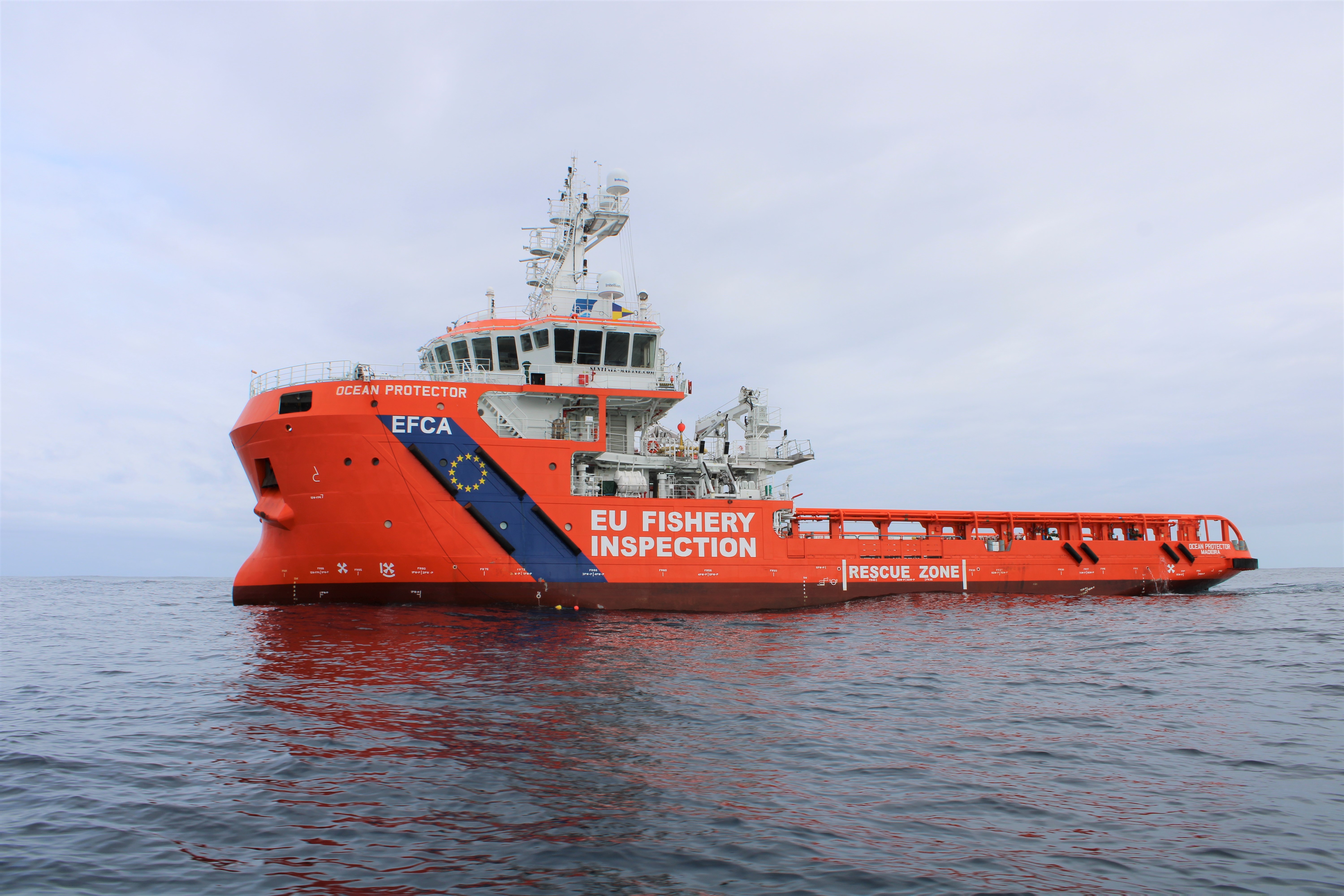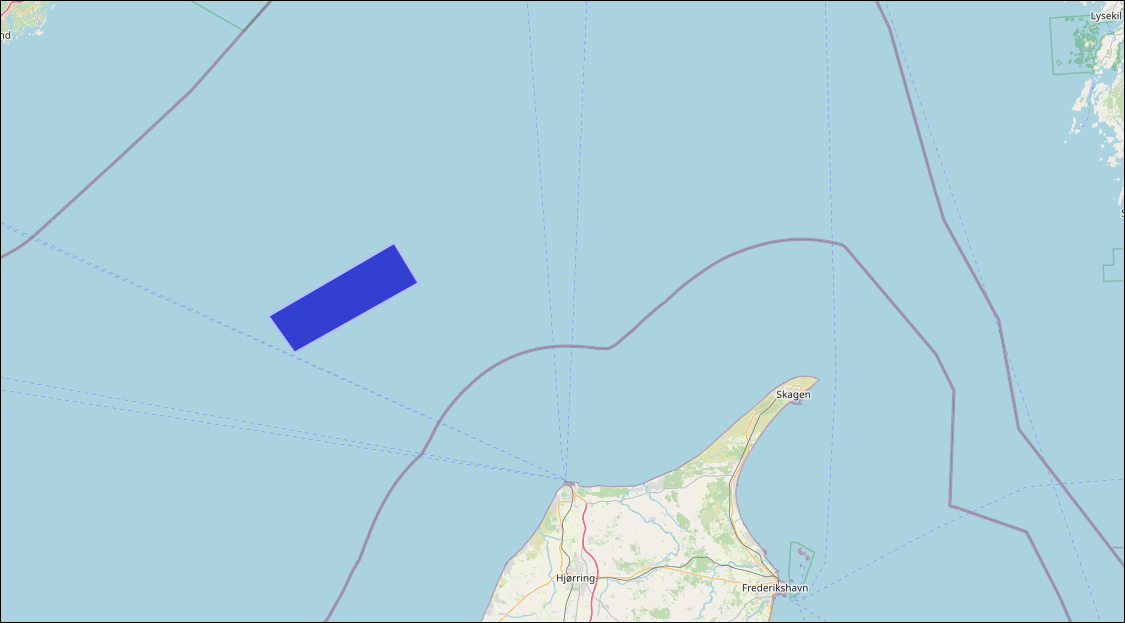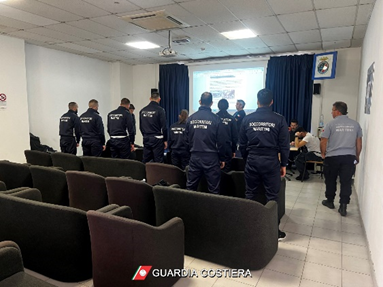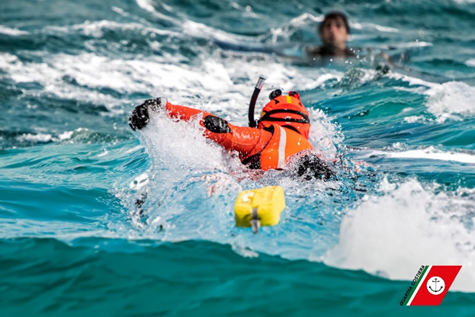Denmark has established a new Real-Time Closure in the North Sea starting from 22/02/2024 to 13/03/2024 23:59 hrs.
Search results
Denmark has established a new Real-Time Closure in the North Sea starting from 10/03/2024 to 30/03/2024 23:59 hrs.
Denmark has established a new Real-Time Closure in their waters of The Skagerrak starting from 13/03/2024 to 02/04/2024 23:59 hrs.
The Netherlands has established two new Real-Time Closures in the North Sea starting from 08/03/2024 to 29/03/2024 23:59 hrs.
Belgium has established a new Real-Time Closure in the North Sea starting from 14/03/2024 to 03/04/2024 23:59 hrs.
During the morning of next Friday, 15 March 2024, one of the three EFCA offshore patrol vessels (OPVs), the Ocean Protector, will open its doors to authorities invited to the 20th anniversary of the North Western Waters Advisory Council and the Pelagic Advisory Council.
The OPV Ocean Protector is one of the three inspection platforms chartered by the European Fisheries Control Agency. It is operational all year round as a fisheries patrol vessel to support Member States in the different EFCA´s joint deployment plans. The vessel is deployed in the scope of multipurpose operations in the framework of European cooperation on coast guard functions. The vessel, during its operations, is available for supporting other coast guard functions, inter alia, providing support during search and rescue situations, maritime surveillance and pollution response.
Its deployment enhances the EU capacity to improve the effectiveness of fisheries control operations in the EU and beyond.
The celebration of the 20-year anniversary event of the North Western Waters Advisory Council and the Pelagic Advisory Council takes place on 14 March with an event in which the advisory councils will look back over the past 20 years of existence and the role of stakeholder voices in European fisheries´ governance. During the event there will be a dialogue between stakeholders and decision makers on the potential of the regionalisation process to address challenges ahead and on the future of stakeholder participation in reaching the objectives of the Common Fisheries Policy.
Summary of the technical data of the vessels
• It is a Multi-Role Emergency Response and Rescue Vessels (ERRV) with overall length of 62 meters.
• It has a Dynamic Position System to better maintain their position and balance the environmental forces such as wind, waves and currents during the duty while reducing fuel consumption to a minimum.
• It is fully equipped with ergonomic and modern onboard facilities to ensure a comfortable stay and an enjoyable working environment during the patrols.
Background
EFCA is a European Union agency that promotes the highest common standards for the control, inspection and surveillance under the Common Fisheries Policy (CFP). EFCA was established to organise operational coordination activities by the Member States and to assist them to cooperate so as to comply with the rules in order to ensure its effective and uniform application.
The added value of the work of the agency lies in its contribution to sustainable fisheries by enhancing compliance with conservation and management measures and to a European-wide level playing field for the fishing industry.

Denmark has established a new Real-Time Closure in their waters of The Skagerrak starting from 21/03/2024 to 10/04/2024 23:59 hrs.

L’Agence européenne de contrôle des pêches (AECP) a lancé aujourd’hui, dans le cadre du projet e-Fishmed financé par l’Union Européenne (UE), un programme d’échange afin de renforcer la coopération et favoriser l’échange d’expériences et de bonnes pratiques dans le domaine de la lutte contre la pêche illicite, non déclarée et non réglementée (INN).
Le programme d’échange s’adresse aux inspecteurs des pêches et aux opérateurs des centres de surveillance des pêches (CSP) des cinq pays bénéficiaires du projet e-FishMed : Algérie, Libye, Maroc, Mauritanie et Tunisie. Le programme bénéficie du soutien technique des partenaires du projet e-FishMed : France, Italie, Malte, Portugal et Espagne.
La première édition du programme d'échange est organisée en coopération avec le ministère espagnol de l'agriculture, de la pêche et de l'alimentation, qui accueillera les participants des pays bénéficiaires et leur fera partager son expérience et ses méthodes de travail du 15 au 19 avril 2024.
Les participants commenceront le programme à Madrid où ils visiteront le Centre espagnol de surveillance des pêches et participeront à plusieurs sessions qui faciliteront le partage des connaissances et des meilleures pratiques et renforceront les contacts, les réseaux et la coopération. L'échange se poursuivra à Malaga où les participants prendront part en tant qu'observateurs aux activités d'inspection des pêches.
La mise en place du programme d'échange est l'un des résultats attendus du projet e-FishMed financé par l'UE, soutenu et mis en œuvre par l'AECP. Le projet e-FishMed contribue à l'harmonisation des activités de contrôle et d'inspection des pêches et encourage la coopération contre la pêche illicite, non déclarée et non réglementée (INN) et la mise en œuvre effective du contrôle des mesures de conservation et de gestion dans le Méditerranée. Le projet contribuera également à créer les conditions d'une économie bleue durable dans cette région.
Vous trouverez plus d’informations sur le projet e-FishMed ici.
Contexte
L’AECP est une agence de l’UE qui promeut les normes communes les plus élevées en matière de contrôle, d’inspection et de surveillance dans le cadre de la politique commune de la pêche (PCP). L’AECP a été créée pour assurer la coordination opérationnelle des activités des États membres et les aider à coopérer afin de respecter les règles de la PCP et en garantir l’application effective et uniforme. L’AECP soutient également les pays tiers dans le cadre de projets de renforcement des capacités financés par l’UE.
La valeur ajoutée des travaux de l’Agence réside dans sa contribution à la pêche durable en renforçant le respect des mesures de conservation et de gestion et à la mise en place de conditions de concurrence équitables dans le secteur de la pêche.
- Communication de la Commission européenne sur l’économie bleue durable
- Communication conjointe sur «Un partenariat renouvelé avec le voisinage méridional » publiée en février 2021
Today, the European Fisheries Control Agency (EFCA), in the context of the European Union funded e-FishMed project, launched an exchange programme to enhance cooperation and to promote sharing of expertise and best practices in the fight against Illegal, Unreported and Unregulated (IUU) fishing.
The exchange programme is targeted to fisheries inspectors and Fisheries Monitoring Centres (FMC) operators of the five e-FishMed Beneficiary Countries: Algeria, Libya, Morocco Mauritania and Tunisia. The programme is technically supported by the e-FishMed Project Partners: France, Italy, Malta, Portugal and Spain.
The first edition of the exchange programme is organised in cooperation with the Spanish Ministry of Agriculture, Fisheries and Food that will kindly host participants from Beneficiary Countries, sharing with them working experience and methods from 15 to 19 April 2024.
The participants will start the programme in Madrid where they will visit the Spanish Fisheries Monitoring Centre and they will participate to several sessions that will facilitate sharing of knowledge and best practices and will reinforce contacts, networks and cooperation. The exchange will continue in Malaga where the participants will take part as observers to fishery inspection activities.
The implementation of the Exchange Programme is one of the expected results of the EU-funded e-FishMed project, supported and implemented by EFCA. The e-FishMed project contributes to harmonising fisheries control and inspection activities and promotes cooperation against Illegal, Unreported, Unregulated (IUU) fishing and the effective implementation of control of conservation and management measures in the Mediterranean. The project will also contribute to creating the conditions for a sustainable Blue Economy in that area.
More information about the e-FishMed Project can be found here.
Background
EFCA is an EU agency that promotes the highest common standards for the control, inspection, and surveillance under the Common Fisheries Policy (CFP). EFCA was established to organise operational coordination activities by the Member States and to assist them to cooperate so as to comply with the CFP rules in order to ensure its effective and uniform application. EFCA also supports non-EU countries in the framework of EU funded capacity building Projects.
The added value of the work of the agency lies in its contribution to sustainable fisheries by enhancing compliance with conservation and management measures and to a playing field for the fishing industry.
- European Commission Communication on Sustainable Blue Economy
- Joint Communication on a “Renewed partnership with the Southern Neighbourhood” issued in February 2021
The European Fisheries Control Agency (EFCA), in collaboration with the European Maritime Safety Agency (EMSA) and the European Border and Coast Guard Agency (Frontex) has launched the first Coast Guard Capacity Building and Training Exchange Programme at European level. This initiative, funded by the European Commission, aims to bolster the development of an academy and training network and implement an exchange programme between administrations from different countries.
The exchange programme facilitates the exchange of theoretical and practical knowledge and best practices among authorities engaged in coast guard functions. By doing so, the project contributes to preparing staff for joint missions and operations, benefiting EU Member States (MS), European Free Trade Association (EFTA) countries and Schengen associated countries' coast guard authorities and entities. It offers participants valuable insights into international cooperation, crucial for joint missions, operations and exercises conducted at the EU level or with third countries. This programme is therefore also very relevant for the EU Maritime Security Strategy and Action Plan[1], which seeks to strengthen Europe's autonomy amid growing threats to maritime security.
The first exchange took place in Sarzana, Italy, with participants from the Icelandic Coast Guard and the Portuguese Maritime Life Saving Institute in the Italian Coast Guard's Rescue Swimmer Course, with a week dedicated to theoretical and practical lessons.
Overall, there were 86 candidates that were assigned to an exchange and 34 candidates to reserve lists. The next exchanges for this semester involve authorities from Croatia, Finland, France, Italy, Romania, Portugal, Poland and Spain.
"The programme sets sail on a journey of collaboration, learning, and empowerment, striving to shape the future of coast guard functions across Europe,” said Susan Steele, EFCA Executive Director. "The Coast Guard Capacity Building and Training Exchange Programme is designed to be inclusive, covering a broad spectrum in the coast guard functions area. It promotes cross-sectorial collaboration, strengthens common understanding, and encourages inter-agency cooperation."
Visit the Coast Guard Portal to read more about the exchanges’ outcomes: The Exchange Programme | European Cooperation on Coast Guard Functions (europa.eu)
Background
EFCA is an EU agency that promotes the highest common standards for the control, inspection, and surveillance under the Common Fisheries Policy (CFP). EFCA was established to organise operational coordination activities by the Member States and to assist them to cooperate so as to comply with the CFP rules in order to ensure its effective and uniform application.
With a view to reinforcing European cooperation on Coast guard functions, EFCA’s founding regulation was amended in September 2016 entrusting EFCA — together with the European Border and Coast Guard Agency (Frontex) and the European Maritime Safety Agency (EMSA) — to support national authorities carrying out coast guard functions at national and Union level and where appropriate at international level.






[1] Council conclusions on the Revised EU Maritime Security Strategy (EUMSS) and its Action Plan, 14280/23. Brussels, 24 October 2023.
